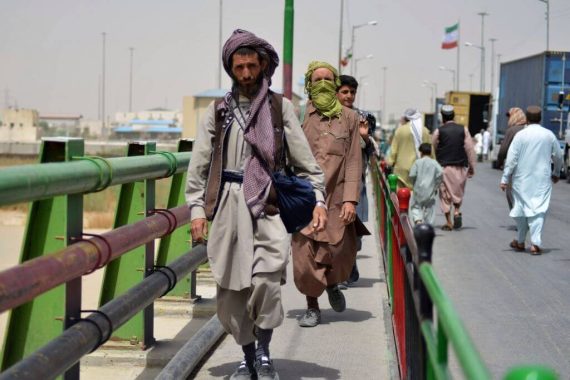Despite being a fundamentalist Shia Islamist power, some may have been surprised to see Iran hosting the Sunni Islamist Taliban in Tehran and congratulating them over their victory in their 20-year war against the United States that finally saw Kabul back in the hands of the insurgents and the Joe Biden administration withdrawing all forces not long after. But it is precisely the Taliban’s military successes and their ability to inflict humiliating defeats against the U.S. that has Iran so overjoyed, rather than any particular affinity for the Taliban themselves.
Iran played a role in the U.S. invasion of Afghanistan
It is easy to forget considering Iran’s incessant rhetoric on being the spearhead of the so-called “Axis of Resistance”, but Tehran played a significant role in facilitating the invasions of both Afghanistan in 2001 and Iraq in 2003.
Far from being warm friends, Iran once considered going to war against Afghanistan in 1998 after the Taliban massacred not only hundreds of Hazara Shia but also managed to kill eight Iranian diplomats and a journalist at Tehran’s consulate in Mazar-i Sharif. Seeing an opportunity to avenge themselves against the Taliban, the Iranian regime provided military and intelligence support to the George W. Bush administration, helped the United States to topple the Taliban and force them out of power.
The Iranian regime then spent the better part of the first decade of the War on Terror agitating against drawing any distinction between the Taliban and Al-Qaeda, insisting that the two ought to be considered inseparable from one another and deserving of the same powerful military response from Western powers.
However, once Tehran’s ambitions for nuclear weapons came under the spotlight and international pressure began to mount against them led by Washington, they suddenly changed their tune. Iran began to host Taliban fighters and commanders in Iran, extended some weapons and other supplies to the militants, and even tried to insert themselves into the Afghan peace process brokered by the Donald Trump administration in 2019.
It suddenly became in Iran’s interests to support the Taliban if only to ensure that the Afghan group could inflict continued losses against the United States and to apply pressure against Washington in the nuclear talks that were first started by Barack Obama, abandoned by Trump, and now being courted once again by Obama’s protégé and ideological successor Joe Biden. By supporting the Taliban’s military activities and providing shelter to its leadership and commanders, Iran was using the group to humiliate the Americans in Afghanistan and weaken their resolve against Tehran.
Up until that point in time, however, it is clear that Iran has never harbored any real love for the Taliban and has in fact fought them and opposed them since the 1990s.
The Iran-Taliban honeymoon didn’t last
It is perhaps unsurprising that a fundamentalist Shia regime would view the existence of a fundamentalist Sunni regime right across its border as being anathema to its national security interests. After all, and until very recently where they showed some softening, the Taliban have shown a very low tolerance to Shia minorities in Afghanistan and have perpetrated massacres against them.
Additionally, there is an ethnic element to Persian Iran’s dislike of the Taliban. While they do recruit from across the ethnic divide, the Taliban are predominantly Pashtuns and they have disputes with Persian-speaking nationalist groups, particularly the Tajiks of the Panjshir valley and surrounding areas. Only recently, Ahmad Massoud, the son of famed Soviet-era Afghan militia commander Ahmad Shah Massoud, launched a rebellion against Taliban rule with the assistance and urging of the Tajik former Vice President Amrullah Saleh.
That rebellion was swiftly crushed after offers by the Taliban to power share were rebuffed by Massoud and Saleh, but while the operation was still underway, Iran repeatedly made announcements that the Taliban’s campaign breached international law (without explaining how) and that the Taliban conquest of Panjshir was to be “condemned in the strongest terms”. Former Iranian President Mahmoud Ahmadinejad went so far as to implicate Pakistan in the Panjshir campaign and accused the U.S. of concocting a “Satanic plot” by surrendering power to the Taliban.
Recommended
While it is still too early to get a precise read on what Iran intends for the Taliban, it knows that the new Afghan government is in dire need of international aid and recognition and so it may try to leverage this weakness against them. However, Iran’s allies in Panjshir have been all but wiped out, and its Shia Hazara militia proxies in the Fatemiyoun Brigades who served with such bloody distinction in killing Syrian civilians are also in no position to fight Afghanistan’s new rulers – at least not yet.
Tehran will therefore likely try to patiently wait for an opportunity to undermine the Taliban again, precisely as they did when they facilitated the U.S. invasion in 2001. They will agitate against them diplomatically by encouraging other states not to engage with them, and will attempt to foment domestic discord by pushing Afghanistan’s Shia minority to rebel while simultaneously offer political and military support to Persian-speaking ethnic minorities.
Obviously, the Taliban are not going to forget who the Iranians fundamentally are and their approach toward them since 1996. The marriage of convenience in order to eliminate the U.S.-led Western presence in Afghanistan is now at its end, and the honeymoon period did not last long at all. The Taliban will now be wary of Iranian subterfuge and will crackdown vigorously against any plot against them, perhaps forming a flashpoint for future conflict between the neighbouring countries.





